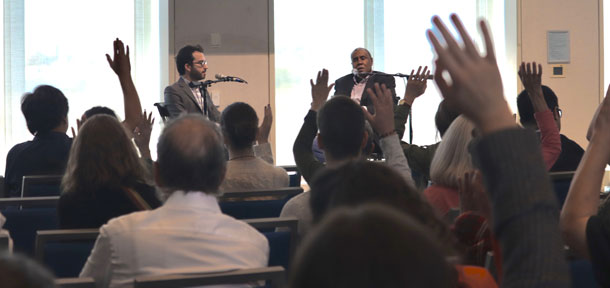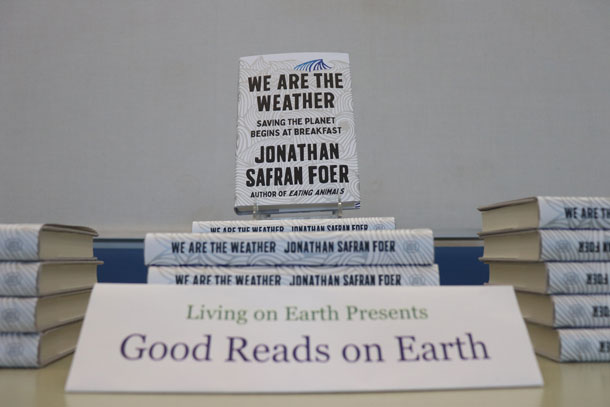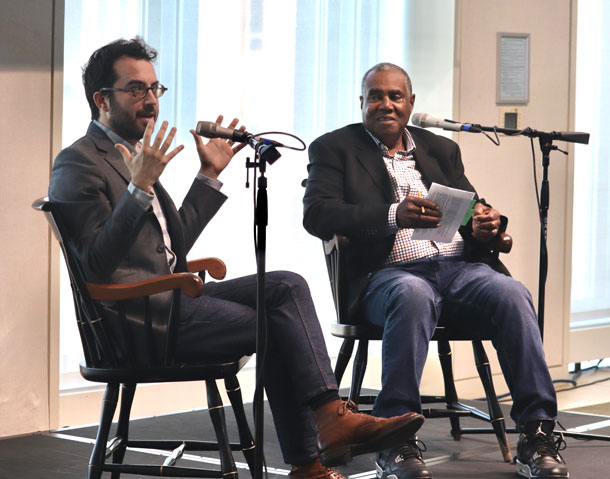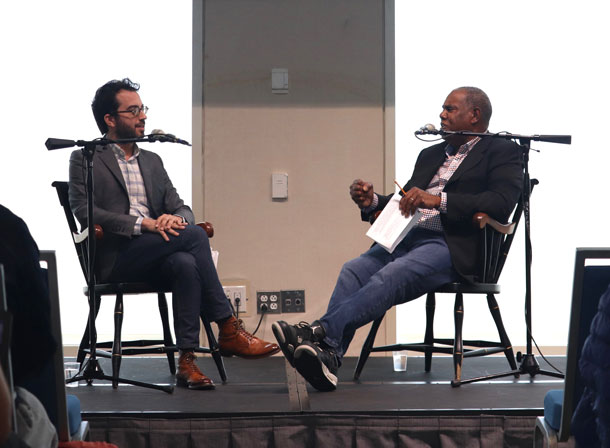Saving the Planet Begins at Breakfast
Air Date: Week of October 11, 2019

Jonathan Safran Foer was interviewed by Steve Curwood in front of a live audience at UMass Boston on October 1, 2019 (Photo: Lizz Malloy)
More people than ever before now believe climate change is happening and is fueled by human activities, but translating that belief into actual greenhouse gas emissions reductions remains a challenge. Jonathan Safran Foer addresses this and more in his new book, We Are the Weather: Saving the Planet Begins at Breakfast. He describes the power of collective actions to deal with the climate crisis, and points to our three meals a day as a great place to start. Jonathan Foer spoke with Host Steve Curwood at a recent live event in Boston.
Transcript
CURWOOD: It’s Living on Earth, I’m Steve Curwood.
Eight in 10 Americans now believe climate change is happening and is fueled by human activities. This according to a recent poll conducted by the Washington Post and the Kaiser Family Foundation. But so far believing in climate change has yet to lead to effective action to prevent its most dire impacts. Jonathan Safran Foer addresses this and more in his newest book, We Are the Weather: Saving the Planet Begins at Breakfast. He describes the power of collective actions to deal with the climate crisis, and points to our three meals a day as a great place to start. Animal agriculture is a big part of human induced climate change, and he says limiting the amount of meat we eat can go a long way towards curbing carbon emissions. Jonathan Safran Foer spoke with me at the inaugural “Good Reads on Earth” live event at UMass Boston.
CURWOOD: Jonathan, thanks for joining us today.
FOER: Thank you so much.
CURWOOD: Your book takes a really fascinating take at the climate emergency of today. And you start with the notion that we're kind of removed from it, that the climate emergency is not here; it's over there. What do you mean by that?
FOER: I should begin by saying more than anything, the book is a real personal exploration of my own responses and lack of responses to the climate crisis and was the result of having reached a place that felt intolerable. Do you have kids by any chance?
CURWOOD: Yes.
FOER: Okay. So I have kids, and I don't know if you've ever had the experience of the kids, you know, playing in the other room, and they're rough housing, but it's okay. It's tolerable. And you're trying to get something done, let's say the kitchen counter, and they're making more noise and somebody hits somebody, and it's still okay. And then something breaks, and it's still okay. And then somebody starts crying, and you slam your hands on the kitchen counter and say, "enough." And then you get up from what you're doing and you go over there. That was more or less the moment that I had, except that I was both the kid and the parent, where I heard myself saying, over and over, somebody has to do something. But the somebody's never included me. And I felt these extremely brief and contained periods, or moments really, of alarm of anger, of sadness, almost always when an image was in front of me, an image of Amazon burning an image of another superstorm, wildfires in California. And yet, when the image wasn't in front of me, those emotions, and my feeling of connection to them all but completely vanished. It was very, very easy to get back to the life that I was living, which included many bad behaviors that were contributing to the problems that so alarmed me. So, I decided to devote time and mental space to figuring out how to stop saying someone has to do something and to learn what it is that an individual might do.
CURWOOD: Talk to us about one of the incidents that really kind of got you going, and that was when Superstorm Sandy fired up and you found yourself out of town.

Living on Earth recorded this interview live as part of its event series, Good Reads on Earth. (Photo: Lizz Malloy)
FOER: I was in Detroit, and giving a reading for a novel and the storm-- everybody knew the approximate path of the storm and the touchdown time in New York. I thought that I was going to be able to catch the last flight out. As it turned out, the flight was canceled. So I rented a car and drove through the night back to New York, for no obvious reason. You know, the house was well prepared for the storm. We had the food and the pantry and the flashlights with the fresh batteries in the closet, fresh water. But I wanted to drive back. I felt the need to drive back. And it's a need. Or it's an action that was sort of easy to applaud. It was easy for my parents, my wife, my kids to applaud it. And it was very easy to applaud myself for having done it.
CURWOOD: Good dad, you showed up.
FOER: Good dad. You did the right thing.
CURWOOD: And?
FOER: And it was largely narcissistic, it felt good to be applauded for having done the thing that is easy to recognize as the right thing. And yet, as I said, it didn't really make any difference. One of the reasons that I mention it is because in the years that followed, I didn't question what I might do to avoid a future superstorm. I mean, even the notion of what an individual might do to prevent a storm is a little bit ridiculous. But I didn't open the question up. And I continued living as I had been living. You know, it feels good to drive home to be with your family, it feels good to be called a great dad. It doesn't feel good to fly less, or it feels good in a very different kind of way. Let's say that.
CURWOOD: Let me quote what you wrote on page 21. And it's, quote, "If we accept a factual reality, but are unable to believe it, we're no better than those who deny the existence of climate change" so, talk to me about that. And there's a story actually present in the book that illustrates this notion of accepting a reality but being unable to believe it.
FOER: Well, what I went on to say is that the future is not going to look back and ask what we felt; the question will be, what did we do. And I have mistaken knowledge in and of itself, for virtuous action. The story that I tell is of a young Catholic, who's in the Polish underground, named Jan Karski, who spent some time in the Warsaw Ghetto, and in extermination camps, acquiring testimonies and evidence of what the Germans were perpetrating for the purpose of bringing them to England and the United States, to show Western leaders what was happening and to beg them to intervene. And he had a famous meeting in 1943, with Justice Felix Frankfurter, who is still considered one of the great minds that America has produced and was himself Jewish. And Karski laid out not the argument, but the evidence. And Frankfurter asked him a series of questions and paced the room and thought about it and sat down and said, "I have to be frank with you. I don't believe what you're telling me." And Karski's colleague, who was with him, said, "How can you? How can you say that, you know, look at look at all of the evidence that's in front of you, why would he lie to you?" And Frankfurter said, "Well didn't say he was lying to me, so that I'm unable to believe him. My mind and my heart were made it in such a way that I can't believe him." So, he acknowledged not only his inability to believe but his awareness of his inability to believe. And I often find myself in that position, with respect to climate change, of being unable to believe what I know is true. Not believe it in the sense of acknowledging the science, but to believe it in the sense of being shaken by it, you know, in the ways that it would seem to demand.
CURWOOD: So if we're not taking effective action, and you've done this reflection, what is the effective action that we could all take, that would make a difference?

We Are the Weather explores how collective individual action can help fight climate change. (Photo: Lizz Malloy)
FOER: So there are four activities that are considered highest impact in terms of an individual's relationship to climate change, which are flying less, living car free, having fewer children, and eating a plant based diet. So 85% of Americans drive to work. And most Americans live in cities. Most Americans who live in cities, live in cities that were designed to require automobiles. More than half of the flights that are taken in the United States are either for work or for what are called non-leisure personal purposes. And most people aren't in the process of deciding whether or not to have a kid, right this second. So those are three things that we absolutely need to pay attention to and be vigilant about. But they are in a slightly different category than eating, which is a choice that we make three times a day, most of us. It's an unconstrained choice. And it's an opportunity to make a difference right away individually and ideally, collectively.
CURWOOD: Somebody might say, "Well, wait a second, Mr. Foer." The richest 10% of the population is responsible for half of emissions. There are a handful of corporations, that fossil fuel business that are pumping, there's carbon dioxide into the atmosphere. Really, eating to take this on as a form of collective action? And you would say?
FOER: I would say eating as another piece of that puzzle, not in lieu of those other things. It's absolutely the case that we cannot solve this by individual action alone. We need systemic change and legislative change, and food, it would be wonderful if the meat industry were regulated, even if the laws that were already on the books were adhered to. Would I prefer a world in which hamburgers cost what they actually cost, where, you know, the real costs weren't externalized, either because of subsidies or because of a lack of any environmental regulation? That would be great. That would make this much, much easier. I would prefer that. But it's not happening. A lot of the systemic changes that we require are not happening. And the marches and speeches are maybe bringing the change closer, but not quickly. And not quickly enough. So are there things that we can do that will have both real and tangible effects, but also might pull closer some of those systemic changes? You know, when we look at the Amazon burning right now, I haven't met anybody who isn't upset by those images and by that reality. Usually, the emotions that are inspired by those images take the form of anger at Bolsonaro, maybe to a lesser extent at Trump. But you know, 91% of Amazonian deforestation is for the purpose of animal agriculture, either to create land for animals to graze or to create land to grow crops for the animals to eat. I met many farmers in the process of writing the book Eating Animals a decade ago. And I heard over and over and over that we grow what people eat. You know, we are not making dietary choices for consumers; We grow what people ask us to grow. Corporations sell what people buy. It will not solve the problem, you know, any one of us choosing to eat a different dinner later today. But if we could collectively boycott beef, let's say. It's impossible to imagine, but let's just imagine it as a hypothetical. If we could have a global boycott of beef, then we would preserve Amazon.

Jonathan Safran Foer suggested animal agriculture may be responsible for more than half of human-related greenhouse gas emissions (Photo: Lizz Malloy)
CURWOOD: So Jonathan, you struggle with having hamburgers from time to time yourself? You you preach this business of a vegetable based diet and yet the sizzle...
FOER: It's that voice again. You're making me hungry right now.
CURWOOD: ..burger slid on a toasted bun with your favorite sauce..
FOER: Yeah
CURWOOD: ...the aroma coming from the grill...
FOER: I'm gonna my saliva is going to destroy the microphone. You have to stop.
CURWOOD: Maybe a nice glass of red wine.
FOER: Well, red wine. nobody's taking away your red wine. You should enjoy your red wine. Have two have the red wines and maybe half of the burger. Yeah, I've had a hard time with it. I mean, I should say I haven't eaten meat in years. But that doesn't mean I don't want to, you know, pretty much every meal. I am not the kind of vegetarian who finds meat disgusting. When I see a burger, I don't immediately think meat is murder. I usually think boy, I'd like to eat that. I grew up eating meat. You know, I have a lot of very, very happy memories that involve meat eating: my grandmother's chicken, my dad's grilled hamburgers, the smoked salmon my mom would bring home on special weekends for, you know, treat with bagels. But it is important, I think to move away from the binaries of meat eater, and vegetarian or meat eater, and vegan, which has been our only way of thinking about meat reduction. You're familiar with the beyond burger?
CURWOOD: And the Impossible Burger.
FOER: And the Impossible Burger. 90% of consumers who buy Beyond Burgers in supermarkets also buy meat in that in the period of time that they conducted the study. When KFC introduced their vegetarian fried chicken in Atlanta, about a month ago, I think you may have seen images of people lined up around the block to eat it. What I found inspiring was the statement that KFC released on that day, which was we don't think of this as a food for vegetarians. We think of this as a food for meat eaters who want to reduce the amount of meat that they eat. So, you know, I don't think that there's any great chance that half of the population of America is going to be vegetarian in 10 years, I think there's a pretty good chance that half of the meals eaten in America will be vegetarian in 10 years. And that will have the same outcome in terms of the environment and in terms of animal welfare. But it's a completely different way of looking at the same problem. And it's my hope that we can make that shift away from these binary identities that require identifiers and toward a very reasonable reduction, eating in moderation, which I think people are not only willing but eager to do.
CURWOOD: Jonathan Safran Foer's book is called, We are the Weather: Saving the Planet Begins at Breakfast. Thank you so much for taking the time with me today.
FOER: Thank you. I really appreciated that conversation. Thank you.
Links
We are the Weather: Saving the Planet Begins at Breakfast
Living on Earth wants to hear from you!
Living on Earth
62 Calef Highway, Suite 212
Lee, NH 03861
Telephone: 617-287-4121
E-mail: comments@loe.org
Newsletter [Click here]
Donate to Living on Earth!
Living on Earth is an independent media program and relies entirely on contributions from listeners and institutions supporting public service. Please donate now to preserve an independent environmental voice.
NewsletterLiving on Earth offers a weekly delivery of the show's rundown to your mailbox. Sign up for our newsletter today!
 Sailors For The Sea: Be the change you want to sea.
Sailors For The Sea: Be the change you want to sea.
 The Grantham Foundation for the Protection of the Environment: Committed to protecting and improving the health of the global environment.
The Grantham Foundation for the Protection of the Environment: Committed to protecting and improving the health of the global environment.
 Contribute to Living on Earth and receive, as our gift to you, an archival print of one of Mark Seth Lender's extraordinary wildlife photographs. Follow the link to see Mark's current collection of photographs.
Contribute to Living on Earth and receive, as our gift to you, an archival print of one of Mark Seth Lender's extraordinary wildlife photographs. Follow the link to see Mark's current collection of photographs.
 Buy a signed copy of Mark Seth Lender's book Smeagull the Seagull & support Living on Earth
Buy a signed copy of Mark Seth Lender's book Smeagull the Seagull & support Living on Earth

